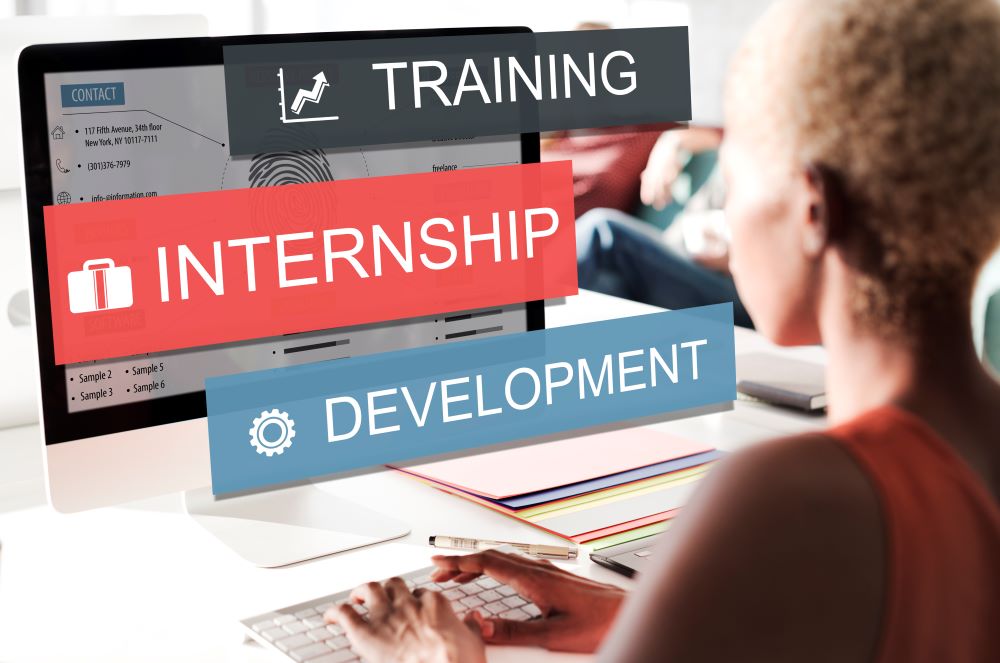During an internship you can begin to consider what other courses and skills development training you can access, if you are not offered a permanent position with your employer, or if you decide to continue your study or training with another organisation or business.
Choices include:
What is Access to Work?
Access to Work can help you get or stay in work if you have a physical or mental health condition or disability.
The support you get will depend on your needs. Through Access to Work, you can apply for:
- a grant to help pay for practical support with your work.
- support with managing your mental health at work.
- money to pay for communication support at job interviews.
This guide is also available in Welsh (Cymraeg), British Sign Language (BSL) and Easy Read format.

Practical support with your work
Access to Work could give you a grant to help pay for things like:
- specialist equipment and assistive software
- support workers, like a BSL interpreter, a job coach, or a travel buddy.
- costs of travelling to work if you cannot use public transport.
- adaptations to your vehicle so you can get to work.
- physical changes to your workplace
Your workplace can include your home if you work from there some or all the time. It does not matter how much you earn. If you get an Access to Work grant, it will not affect any other benefits you get and you will not have to pay it back. You or your employer may need to pay some costs up front and claim them back later.
How to apply: Check you’re eligible and then apply for an Access to Work grant.

Mental health support
You can get support to manage your mental health at work, which might include:
- a tailored plan to help you get or stay in work
- one-to-one sessions with a mental health professional
How to apply: Check you’re eligible and then apply directly to either Able Futures or Maximus.

Communication support for job interviews
Access to Work can help pay for communication support at a job interview if:
- you’re deaf or hard of hearing and need a BSL interpreter or lip Speaker
- you have a physical or mental health condition or learning difficulty and
need communication support.
Find out more and apply for communication support at a job interview.

What Access to Work will not pay for:
Access to Work will not pay for reasonable adjustments. These are the changes your employer must legally make to support you to do your job. Access to Work will advise your employer if changes should be made as reasonable adjustments. For more information click the following link:
If I am not successful in securing an internship, or not offered a permanent position at the end of the programme, where else can I try?
It can be disappointing when you are not offered a place on an internship, however, it’s important not to give up! There are other opportunities that may be available to you if you are unsuccessful or if you decide to move on to another programme at the end of your internship.
Adult education
Education and training courses for adults aged 19+ (must be 19 on the 1st of August of the current academic year). They result in formal, accredited qualifications that are recognized by future employers.
Search for courses | Cambridgeshire & Peterborough | Growth Works With Skills
Supported Internships for learners with an Education Health Care Plan
Supported internships combine studying with a work placement. They are available for young people, aged 16 to 24, with Special Educational Needs and Disabilities (SEND), who have an education health and care (EHC) plan.
Benefits for your business
If you host a work placement, you can:
- shape a job role for the needs of your business and the supported intern.
- save on recruitment costs and improve recruitment prospects if you hire the intern at the end of the programme.
- increase your confidence in employing individuals with additional needs and diversify your workforce.
Cost: A supported internship is a free government scheme, you may have your own business costs, for example time spent training. You can choose to pay the intern or cover their expenses, but this is not a requirement.
Duration: A work placement can range from 6 to 12 months.
Find out more about supported internships and work placements
Apprenticeships
Apprenticeships are available for individuals over the age of 16 and combine on the job training with study. Apprenticeships are available up to a university degree level & above (level 7) and can be completed in a range of sectors.
Skills Boots Camps
Skills Bootcamps are flexible training courses for adults aged 19+ (you must be 19 on the 1st of August of the current academic year). They are available in a range of sectors such as digital, engineering or green skills. They may not necessarily result in an accredited qualification.
The courses help improve career opportunities and include an interview with an employer. These courses are free for learners who are self-employed, unemployed, or looking for a career change.
Skills Bootcamps can last up to 16 weeks and for a minimum of 60 Guided Learning hours.
To find out more about the opportunities mentioned above please click on the link below.
